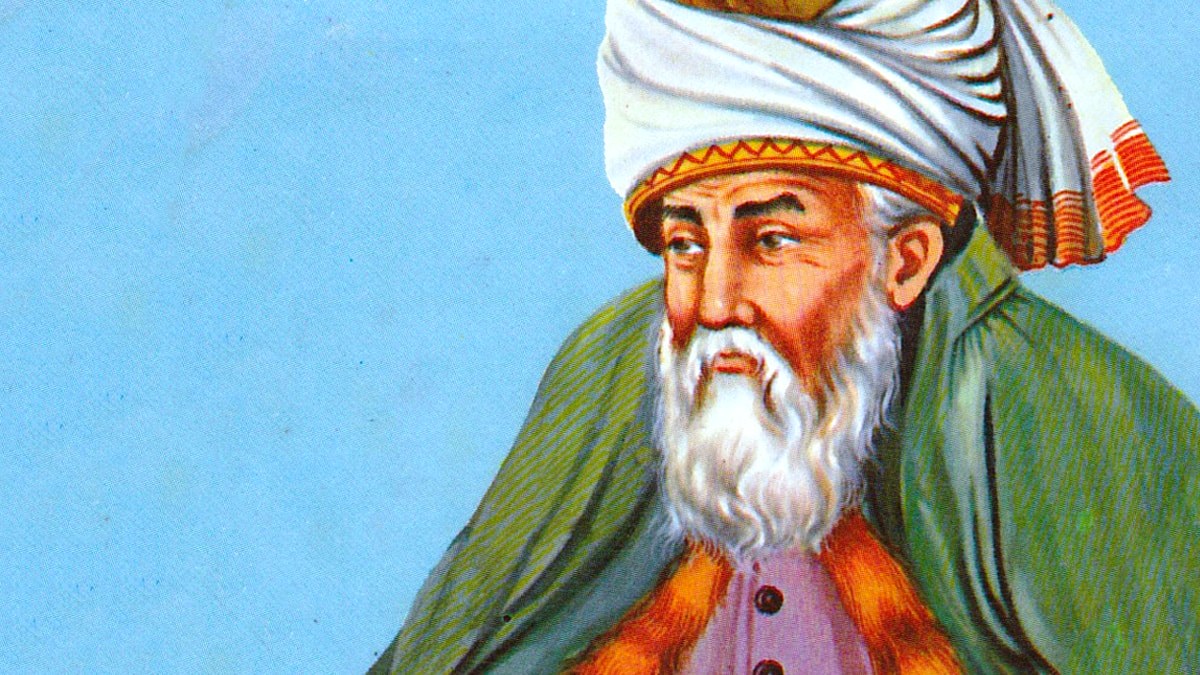by Umair Rashid
We often look for mistakes in people and disown them quickly. This book has a message to treat everybody with love, kindness and humility. Always try to focus on improving oneself rather than judging and looking for other faults
The Forty Rules of Love is a novel written by Turkish author ElifShafak. He is the acclaimed author of nine novels including The Bastard of Istanbul, The Flea Palace and Honour, and is the most widely read female writer in Turkey. This book was published in 2010 by Penguin Books. This book explains how Shams of Tabriz, the notable Persian poet transformed Mawlana Jalaluddin Rumi, a famous Islamic scholar into a Sufi (mystic) through love.

Turkish Novelist Elif Shafak
The story starts with Ella Rubinstein who has a husband, three teenage children, and a pleasant home. She has everything to feel confident and fulfilled. But still, there is an emptiness at the heart of Ella’s life – an emptiness, which is once filled by love. Being a graduate in English Literature, she is assigned a task to write a report on the manuscript Sweet Blasphemy, a historical, mystical novel on the remarkable bond between Rumi and Shams of Tabriz authored by A Z Zahara.
So when Ella reads this manuscript and the forty rules of life and love marvellously discussed, she is shocked out of herself. Turning her back on her family she embarks on a journey to meet the mysterious author of this work and eventually falls in love with him. The other reason being the unfaithfulness by her husband and the affairs he secretly engages in; paying less attention towards her. This manuscript turns out to be a quest infused with Sufi mysticism and verse, taking Ella and us into an exotic world where faith and love are heartbreakingly explored.
A letter from Master Seyyid Burhaneddin is sent from Kayseri to Baghdad in February 1243 on the name of Baba Zaman, who is the head of the dervishes residing in his supervision. The writer says; “that in Konya there lives a great Islamic scholar by the name Rumi who is so talented and judicious but there is something missing in his life – an emptiness that neither his family nor his disciples can fill. Thus, he is in dire need of a companion, a friend of the paths Quran says “Believers are each other’s mirrors.”
As soon as the letter arrives in the dervish lodge, everyone gets curious about the content of the letter headed to their master. Baba Zaman after reading the letter conveys the same message to all the dervishes and asks them to raise their hands voluntarily for this journey to Konya. Several dervishes raise their hands, excited and impatient before Baba Zaman waves and intervene again by saying these words: “The journey is beset with great danger and unprecedented hardships, and there was no guarantee of coming back.” Instantly all the hands come down except the one of Shams of Tabriz.

Forty Rules of Love, a novel by Elif Shafak
Though initially Baba Zaman doesn’t get happy and convinced with his decision of going there and delays it for some time. However, after some months he sets warmly Shams of Tabriz for this journey to Konya to meet his companion.
Upon this journey, Shams meets with a lot of people and preaches the message of loving God and also how much God loved us. He preaches to feel God’s love towards us. At one time he meets a drunkard who is so ruthlessly beaten by the security guard at midnight for drinking wine and left in blood in the street. On seeing him, Shams greets him warmly and after seeing him in blood gives him silver flask from the pocket of his robe. He asks him to apply this ointment to his wounds. The drunkard gets so surprised by his kindness as he had never seen anyone treat him like this. Rather every one pinched him with taunts and said bad about him even this security guard who treated him so harshly.
When he said this to Shams of Tabriz; he replied “They had no right to do this. Every individual is self-sufficient in his search for the divine. There is a rule regarding this (among their forty rules): We were all treated in His image, and yet we were each treated different and unique. No two people are alike. No two hearts beat to the same rhythm. If God had wanted everyone to be the same, He would have made it so. Therefore, disrespecting differences and imposing your thoughts on others is tantamount to disrespecting God’s holy scheme.”

Molvi Moulana Rumi, an art work
Similarly, on another occasion, he saves a whore (who unfortunately in teenage gets landed in a brothel) from getting lynched by people (that too on the instruction of someone who also used to visit brothel) she secretly comes to listen to Rumi’s speech in a mosque. After managing running from there with the help of Shams, she meets him again and whole-heartedly thanks him!
But she also gets so surprised the way Shams treats her despite knowing she is a whore.To this she says, “despite if I want to change and get closer to God, these men will continue to hate me; they will never listen to me.” On this Shams replies, “It’s one of the forty rules. If you want to change the way others treat you, you should first change the way you treat yourself. Unless you learn to love yourself, fully and sincerely, there is no way you can be loved. Once you achieve this stage, however, be thankful for every thorn that others might throw at you. It is a sign that you will soon be showered in roses.” Thus, he gives a ray of hope to all those who feel there is no way to repent and turn back to God.
Finally, Shams of Tabriz meets his companion Rumi in Konya on October 31, 1244. The air has a new chill and the winds blow stronger, announcing the departure of autumn. Rumi takes Shams to his house which changes everything there. He finds more solace with Shams now than with his family. Shams teaches Rumi the real way of loving God. Not just for the sake of dreaming heaven and fearing hell.
He teaches him the rule number twenty-five as,” Hell is in the here and now. So is heaven. Quit worrying about hell or dreaming about heaven, as they are both present inside this very moment. Every time we fall in love, we ascend to heaven. Every time we hate, envy, or fight someone, we tumble straight into the fires of hell.”
Why worry so much about the aftermath, an imaginary future, when this very moment is the only time we can truly and fully experience both the presence and the absence of God in our lives? Sufi’s love God simply because they love Him, pure and easy, untainted and non-negotiable. This is what Sufism preaches!
Now after spending some years with Rumi, Shams thinks that huge part of Rumi’s transformation is complete. Once a rigid scholar who disliked poetry and a preacher who enjoyed the sound of his own voice as he lectured others, Rumi is now turning into a poet himself, becoming the voice of pure emptiness, through he might not have realized this fully yet.
He remembers Baba Zaman’s saying that for the silk to prosper, the silkworm had to die. So, he decides now part away with Rumi.
However, Smash’s separation kills Rumi that he can’t think a second except him being his spiritual companion. He pleads his son to search him and bring him back. The son does the same and Shams comes back after a year. But his presence in the family had already disturbed there the entire system. Even in society, he had developed numerous critics with some saying of him as a heretic dervish. Shams’s presence in home forces Rumi’s son with the help of others to plan his murder. Ultimately, he is killed in March 1248. It comes nothing less than a heartbeat to Rumi who has now transformed into a poet.
Ella on the other hand continues to exchange e-mails with A Z Zahara while reading this manuscript and their love for one another growing with each passing day. They ultimately then plan to meet and that is when Ella comes to know about his severe illness (skin cancer) and according to doctors can’t sustain any longer.
So he asks Ella that he can take her along with him to Amsterdam but can’t promise future. But she decides to spend this short time with him and together they travel the world. Until a day comes on September 7, 2009, and Aziz passes away and is buried in Konya, following in the footsteps of his beloved Rumi.
She informs her daughter about the same and that she is now moving back to Amsterdam by concluding the rule No Forty saying as, “A life without love is of no account. Don’t ask yourself what kind of love you should seek, spiritual or material, divine or mundane, Eastern or Western… Divisions only lead to more divisions. Love has no labels, no definitions. It is what it is, pure and simple.
“Love is the water of life. And a lover is a soul of fire!
“The universe turns differently when fire loves water.”

Umair Rashid
For me, this book has been a wonderful read. It finds its greater relevance in present times when hate has dominated the world in diverse forms. We often look for mistakes in people and disown them quickly. This book has a message to treat everybody with love, kindness and humility. Always try to focus on improving oneself rather than judging and looking for other faults. No matter what type of person appears; we are all created by the same God; we ought to guide and love one another. We need to encourage people with love to repent and turn back to God who appear mislead from their true path!
(The author is an economics student in AMU, Aligarh. The opinions expressed in this article are those of the author’s and do not purport to reflect the opinions or views of Kashmir Life.)
from Kashmir Life https://ift.tt/33djwkm
via IFTTThttps://kashmirlife.net
No comments:
Post a Comment